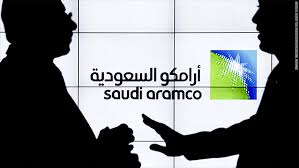Why Saudi Arabia’s giant oil IPO may slip into 2019

It’s expected to be the biggest IPO in history. And officials in Saudi Arabia were hoping it would happen this year.
Proceeds from Aramco’s stock market listing have been earmarked to fund the diversification of the Saudi economy — the centerpiece of Crown Prince Mohammed bin Salman’s Vision 2030 program of reform.
But the sale of shares in the world’s biggest oil company could slip into 2019. The Financial Times and New York Times both reported Monday that the timetable could be delayed.
In a statement on Monday, Saudi Aramco said it continues to review options for the listing, adding that “appropriate decisions will be made in due course.” But it did not comment on the timing.
Here are three reasons why investors may have to wait a little longer to get their hands on its shares.
1. Size and complexity of the deal
Saudi officials have been targeting a value of $ 2 trillion for Aramco. Selling just 5% would raise $ 100 billion, dwarfing all previous IPOs, including Alibaba’s (BABA) $ 25 billion sale in 2014.
In addition to the size of the deal, Saudi Arabia wants to combine a listing on its domestic stock exchange with an IPO in a major global market such as London, or New York. It also has major legal risks to consider.
Related: 6 ways life in Saudi Arabia will change in 2018
Saudi energy minister Khalid Al Falih told CNN on Thursday that “litigation and liability are a big concern in the US” and that officials would not want to subject the oil giant to “that kind of risk.”
Alibaba, and Facebook (FB)in 2012, took between six and nine months to complete regulatory and compliance preparations and investor roadshows ahead of their IPOs.
“If a decision is not made by April, then the IPO would more certainly slip until 2019 because of all the planning and lead time needed,” said one person familiar with the IPO process.
2. Hoping for higher oil prices
Oil prices have been on an upward trajectory since collapsing to $ 26 per barrel in early 2016. Crude oil is currently trading over $ 60 a barrel, but still well below the $ 100 it was worth in 2014.
Every dollar gained makes Aramco a more attractive buy for investors.
“They would probably also like to see the oil price somewhat higher as this would help the valuation,” said James Reeve, chief economist at Samba Financial Group. “Most forecasts point to higher oil prices in 2019, including ours,” he added.
Related: Trump to Saudi Arabia: Bring Aramco IPO to America
OPEC, led by Saudi Arabia, and allies such as Russia have been cutting production since January 2017 to reduce a global supply glut. They agreed in November to extend those production cuts until the end of 2018.
But waiting for more favorable oil market conditions may be a risky strategy.
The International Energy Agency said last week that record oil output from the United States, Brazil, Canada and Norway, “can keep the world well supplied, more than meeting global oil demand growth through 2020.”
3. Upgrading Saudi Arabia’s stock market
Saudi Aramco’s first listing will be on the kingdom’s own stock exchange, the Tadawul, in Riyadh.
But before proceeding with the IPO, Al Falih said the kingdom was waiting for the Tadawul to be granted emerging market status by MSCI. The index compiler is not due to carry out its next review until June.
If MSCI is satisfied with market reforms, the new status is expected to transform the Saudi stock exchange in the eyes of investors, and attract tens of billions of dollars in foreign money.
